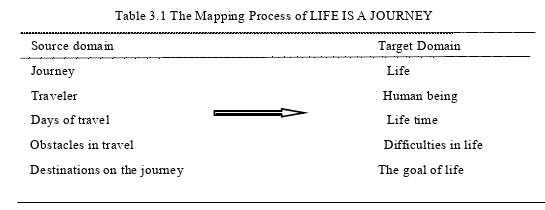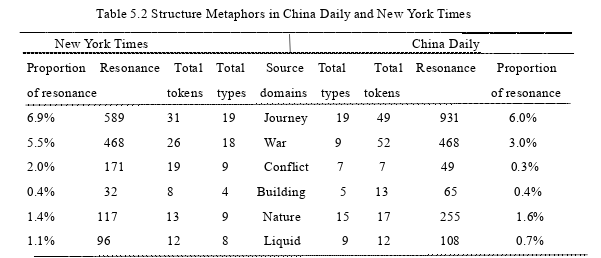语言学论文哪里有?本文在批判性隐喻分析和最佳关联的基础上,对2020年1月至6月《中国日报》和《纽约时报》的标题进行了定性和定量分析。此外,本文还确定了三种主要的概念隐喻,包括空间运动隐喻、人物隐喻和结构隐喻。在语料库中识别出的所有结构隐喻中,有六个次要的概念隐喻,包括旅程隐喻、战争隐喻、冲突隐喻、建筑隐喻、自然隐喻和液体隐喻。
Chapter One Introduction
1.1 Research background
As a rhetorical method, metaphor has been regarded as a method of persuasion since ancient Greece. Aristotle believed that language can express people’s thoughts to some extent. As early as more than 300 AD, Aristotle studied metaphor at the linguistic level and regarded it as the rhetoric. In 1980, famous American scholars Lakoff and Johnson published the book “Metaphors We Live By”, holding the view that our thoughts and actions are based on metaphor. According to Lakoff’s theoretical research, metaphor is the mapping from the source domain to the target domain through a familiar and concrete conceptual domain to describe another unfamiliar and abstract conceptual domain. In other words, we use metaphor to connect the old with the new and to use it as a bridge.
With the gradual maturity of metaphor theories abroad, domestic scholars have also done a lot of research. For example, in the book Metaphor, Shu Dingfang explains in detail the understanding of metaphor and its working mechanism. The book proposes that metaphor is the interaction between two different concepts, the effect of similarity and the dual influence of imagery. It is under the working mechanism of similarity that the shape, appearance and function of things constitute physical similarity on one hand. On the other hand, cultural or other psychological activities constitute psychological similarity. And it is this physical similarity and psychological similarity that people associate to form a metaphor. We understand metaphor mainly from the aspects of context, human beings, knowledge structure and culture. Different environment and various culture will lead to diverse understandings of metaphor, especially in current information era and the rapid development of science and technology of the society. As things around us are constantly updated, metaphors are also updated accordingly.

Chapter Three Theoretical Framework
3.1 Critical Metaphor Analysis
CMA is to use the method of CDA to analyze the function of conceptual metaphors. In 1989, Fairclough proposed the concept Critical Discourse Analysis (CDA) for the first time. This method analyzed language from the perspective of society and history, aiming to reveal the discourse, ideology and power hidden in the discourse model. Unlike other discourse analysis methods, CDA is more concerned with social problems, and thus gradually becomes a new method of text analysis. In Fairclough’s view, the analysis of language should at least include three analytical focuses which are focuses, text, discourse practice and cultural studies. Wodak pointed out that the roots of CDA are the rhetoric of scripture, textual language, social language, and applied language and pragmatics. She basically saw CDA as a research project (Wodak, 2006). Halliday’s systemic functional linguistics is the linguistic basis of CDA, which is in line with Halliday’s view that the language in use has three major functions at the same time including conceptual function, interpersonal function and textual function. According to van Dijik, since the beginning of CDA, there has been no unified theory and methodology and CDA is at most a shared perspective for the analysis of language, symbols and discourse (van Dijk, 1993, p. 131). In his point, CDA contained three analytical dimensions including discourse, socio-cognition and social analysis.
CMA is a new method of metaphor research proposed by Charteris Black in 2014. This method combines the research methods of critical discourse analysis, corpus analysis, pragmatics and cognitive linguistics. In his monograph “Critical Metaphor Analysis Means Corpus Research Methods”, Charteris Black chose political, religious and news reporting discourses to form a corpus, and analyzed the role of metaphor in these discourses, revealing the nature of metaphor and its role. Black has built a large corpus of his own. Among political discourses, Black chose New Labour, British Party Political Manifestos, and American Presidential Speeches as political discourses, while media corpus chose Sports Reporting and Financial Reporting, and religious discourses were selected from Bible, The Old Testament, Koran, and thus discussed and summarized the discourse model of metaphor.
Chapter Five Results and Discussion
5.1 Results of Metaphor Identification
This part gets the result of metaphor identification which includes types and distribution of conceptual metaphors in two corpora. Then, the meaning construction and metaphor function are also figured out through analysis.
5.1.1 Results of Metaphor Types in China Daily and New York Times
First of all, the collected titles of China Daily and New York Times from January to June will be divided into two corpora respectively. Then, the next step is to identify candidate metaphors according to CMA steps and MIP program.
To make sure the candidate metaphors, in the first reading, the candidate metaphor is confirmed in the case of linguistic, pragmatic or cognitive incongruity or semantic tension. According to Charteris’ (2004) views, a metaphor in linguistic criteria is a word or phrase that causes semantic tension by reification, personification and de-personification. When the conceptual system changes, there is a psychological association between the referent attributes of language expression in the original text and the referent attributes in the new target text. If the words are used with a metaphoric sense, they can be then labeled as metaphor key words. Then, to make the identification more accurate, the MIP procedure is used again to judge whether the word is metaphorically used. The specific procedures are applied to identify metaphors are just as what were elaborated in the section of Metaphor Identification.

5.2 Discussion
This part includes discussion about the meaning construction and ideology of conceptual metaphor what’s more, functions of conceptual metaphor are also explored in this part.
5.2.1 Discussion on Meaning Construction of Conceptual Metaphors
In the above analysis, the distribution of different words has been identified in two corpora. And a basic understanding of distribution and proportion has been formed. Thus, specific analysis about examples of different conceptual metaphors will be undertaken.
A. The Analysis of Person Metaphor
The person metaphor takes a large proportion in both China Daily and New York Times. However, through careful observation, we can find that there are common usages of person metaphor key words while there are some unique usage of person metaphor in both corpora. Hence, in the following part, comparisons will be done between keys words in New York Times and China Daily.
a. Common usage of key words
Example 1. Credit Up in May on economic recovery. (China Daily, 6\11)
Example 2. Americans Expect Years for Recovery. (New York Times,5\21)
Chapter Six Conclusion
6.1 Major Findings
On the basis of Critical Metaphor Analysis and Optimal Relevance, this thesis conducted a research in headlines selected from China Daily and New York Times from January to June in 2020, employing both qualitative and quantitative analysis. What’s more, this thesis has identified three major conceptual metaphors including spatial movement metaphor, person metaphor and structure metaphor. Among all structure metaphors identified in the corpora, six minor conceptual metaphors are identified, which contain journey metaphor, war metaphor, conflict metaphor, building metaphor, nature metaphor and liquid metaphor.
The research results show that spatial movement metaphor and person metaphor take the largest proportion among all the conceptual metaphors in both two corpus. These two kind of conceptual metaphors are closely related with our daily life and ourselves. The study presents evidences for the inherent nature of the conceptual metaphors. The general study shows that there are three types of typical metaphors implied to describe different aspects of the target domains. These metaphorical expressions derive from the typical source domains, which are based on our bodily experience of the outside world. Through the cross-domain mapping from the source domains to the target domains, some abstract concepts are easily understood. Some of the notions are so deeply rooted in our daily life that we ignore their metaphorical origins. Conceptual metaphors are fundamental to humans’ thinking and understanding process, which is why it is said that humans’ conceptual system is basically metaphorical.
reference(omitted)

